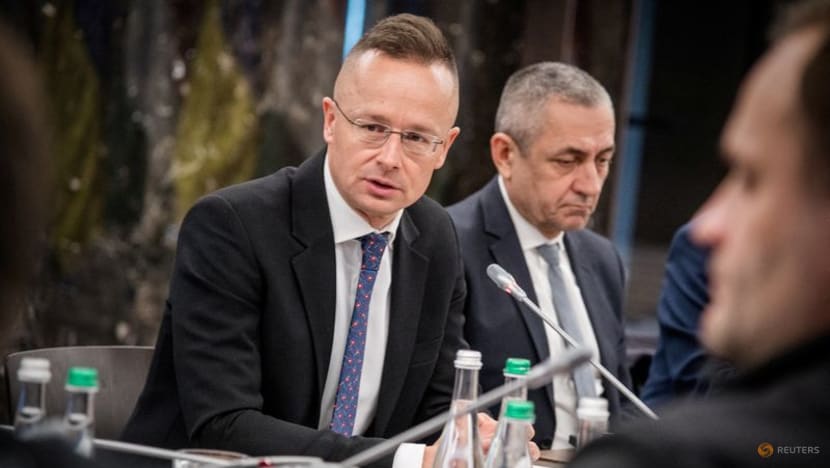Outcome of Russia-Ukraine war depends on who becomes next US President, says Hungarian Foreign Minister
The only way to end the war between Russia and Ukraine is through negotiations, said Hungarian Foreign Minister Péter Szijjártó.

Hungarian Minister of Foreign Affairs and Trade Peter Szijjarto attends a meeting with his Ukrainian counterpart Dmytro Kuleba, amid Russia's attack on Ukraine, in Uzhhorod, Ukraine January 29, 2024. Press Service of Ministry of Foreign Affairs of Ukraine/Handout via REUTERS/File Photo

This audio is generated by an AI tool.
SINGAPORE: The only way to end the war between Russia and Ukraine is through negotiations, but the outcome of these talks would largely depend on who is the next United States president, said Hungarian Foreign Minister Péter Szijjártó.
The Kremlin has turned military superpower Russia into a wartime economy, he said in an exclusive interview with CNA on Tuesday (Mar 19).
“But in the meantime, it's obvious that if the West continues to support Ukraine in a way that has been the case - militarily, weapons and so on - Russia cannot win,” he added.
“So neither of them can win, then it means that the war will be ended by negotiations.”
CONFRONTED WITH TRAGEDY
Mr Szijjártó, who was on a two-day visit to Singapore, believes how long the conflict drags on depends on the outcome of the US presidential election in November, where President Joe Biden and former president Donald Trump are set for a rematch.
Noting that Mr Trump represents “a totally different approach”, he said: “If there's a person nowadays in international politics who has the leverage, the charisma, the commitment to end this war, then it's him.
“It's obvious that those who are in power now, and who are leading big countries, are not in a position anymore to put leverage on both sides to stop.”
Mr Szijjártó said the ongoing conflict between Russia and Ukraine has had a huge impact on Hungary.
“Living in the direct neighbourhood of the war means that you are confronted with the tragic consequences on a daily basis. We have received more than a million refugees from Ukraine. There are still 1,600 kindergartens and schools in Hungary where Ukrainian kids or students are being enrolled,” he added.
“The later the negotiations will be started, the more people will die.”
BASING FOREIGN POLICY ON MUTUAL RESPECT
During his visit to Singapore, Mr Szijjártó met with Second Minister for Foreign Affairs and Second Minister for Education Maliki Osman. They exchanged views on regional developments, and discussed opportunities to further economic and education cooperation.
He also met Minister for Sustainability and the Environment Grace Fu during the trip.
Hungary, which has a population of about 10 million, has been building strong relations with Asian countries apart from Singapore.
On why Asia should partner with Hungary, instead of its larger European neighbours, Mr Szijjártó said: “We are small enough to be forced to always be honest. We always do what we mean, and we always say what we mean.
“And this is a great advantage, when it comes to dealing with Asian countries. We understand that respect as such is still important here. And we always base our foreign policy strategy on mutual respect.”
He noted that the lack of mutual respect between countries is a big issue in international politics now, with some relations characterised by false accusations and threats.
Mr Szijjártó stressed on the need for countries to engage in dialogue, “instead of discriminating against each other, instead of sanctioning each other”.
ASIA SHOULD LEARN FROM EUROPE’S FAILURE AT DIALOGUE
Citing the maritime disputes in the South China Sea as an example, Mr Szijjártó said he hopes that such contentious issues “can be resolved in a peaceful manner”. China and several Southeast Asian countries lay claim to the waterways.
“I do believe that regional ownership is important. So if countries in the region can overcome their own problems, their own debates, I think it's better to leave it to them to overcome,” he added.
“And the most important thing is that everybody should have the openness and readiness to discuss the issues.”
Highlighting Europe’s failure at dialogue, Mr Szijjártó said: “We would not have thought that we would be confronted with a war situation, especially not in our direct neighbourhood. We have lost the ability of ours in Europe to discuss with those with whom we do not necessarily agree on important things.
“But if you give up diplomacy, if you give up the channels of communication, then you basically kill the hope for peaceful solutions. So therefore, what I hope for is that countries in this region are and will be smart enough not to cut channels of communication. and talk to each other.”
Related:
EUROPE LOSING COMPETITIVENESS, NO LONGER PEACEFUL
Mr Szijjártó said Hungary is not satisfied with the current shape of the European Union, of which it is a member.
“Europe is losing competitiveness,” he noted, hoping the elections for the European parliament that take place later this year will improve the current situation.
“Europe is now no more a peaceful continent. Europe is more and more introverted. So we would like to change.”
Mr Szijjártó said Hungary, a landlocked country without energy resources, has had to work hard to build ties with its neighbours.
“So that means that you are dependent on your neighbours and on the surrounding area, whether they help you or not,” he added.
When asked about the future role of the North Atlantic Treaty Organization (NATO), which Hungary is part of, Mr Szijjártó said the military alliance is still vital, adding: “NATO means security and guarantee of sovereignty.”
This comes at a time when China extends its influence.
Last month, China offered to support Hungary on public security matters, beyond just trade and investment relations.
CHINA HAS NOT COMBINED BUSINESS AND POLITICAL INTERESTS
Trade with China is growing, Mr Szijjártó said. “The investments of the big Chinese companies, especially in the field of electric automotive industry, have helped a lot in maintaining the level of economic growth in the country.”
Hungary has always carried out “a rational type of political strategy” which prioritises national interest, he said.
“I've been dealing with the relationship with China for almost 10 years, and I have not experienced one issue where the Chinese would have combined their business interests with political expectations.
“We never heard any expectations from the Chinese towards us politically speaking, while making business.”















